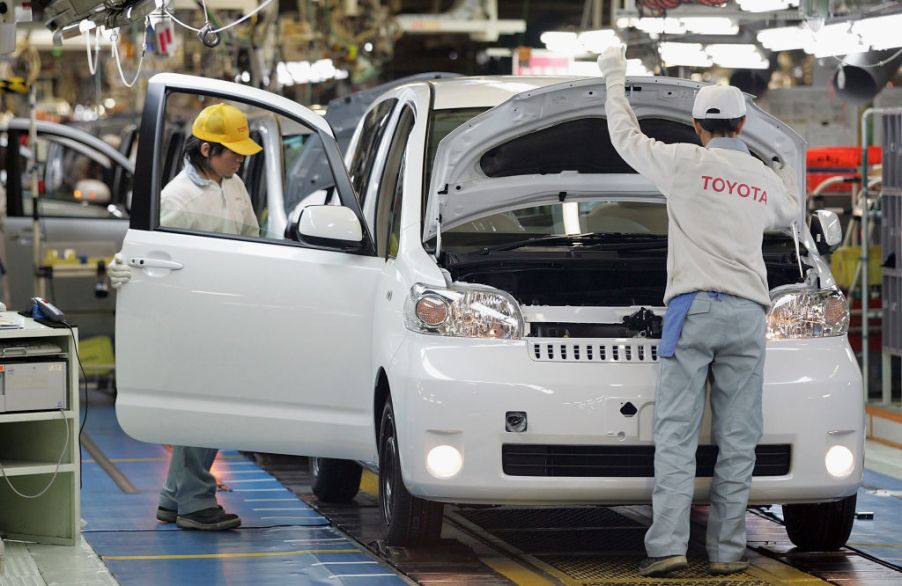
Toyota Is a Big Automaker That Does Things Right
Toyota is currently the largest and most valuable auto company in the world, but it does things its own way. While it is preparing for a future with electric and automated vehicles, Toyota continues making long-lasting cars and trucks. The company generates its high profits by selling a high volume of Toyota models known for dependability plus also partnering with smaller auto manufacturers on additional projects.
How Toyota is different
As one of the biggest automakers, Toyota is in a position to help other Japanese car companies. Unlike other companies, Toyota prefers to own a stake rather than takeover another company completely or even own a controlling interest. And, in Japan, a controlling interest is only a 33.4% stake.
Japan continues to have six auto manufacturers that sell in North America, plus Suzuki and Isuzu which don’t sell in there anymore. In other countries, some of the small companies would have closed or been bought out. Toyota’s partnerships, along with Japanese government protections, allow them to stay alive.
Part-owner
After GM’s 2009 bankruptcy, it sold a minority interest in Subaru and Isuzu to Toyota. Toyota owns a 16.77% share in Subaru Corp, Japan’s smallest automaker. Together the companies developed the Toyota 86 and Subaru BRZ.
In June of 2019, Subaru and Toyota announced a new partnership to develop new midsize and large electric SUVs. The Subaru vehicles will use Toyota technology.
In a new capital alliance announced in August, Toyota will buy $908 million of Suzuki’s shares (4.8% stake) and Suzuki will buy $455 million of Toyota’s shares (0.2%). However, no joint projects have been announced yet.
Toyota’s partnerships
In addition to having a stake in some companies, Toyota also partners in manufacturing and development. It worked with BMW to develop the 2020 Toyota Supra sports car based on the BMW Z4.
The next partnership will be a new shared factory in Huntsville, Alabama, scheduled to open in 2021. At this location, Mazda plans to create a new crossover, while Toyota will build Corollas. The location will also jointly develop electric vehicle technologies.
While already a leader in hybrid technology, Toyota is betting on a new consortium for its future electric vehicles. The group includes Toyota, Subaru, Mazda, Suzuki, and Daihatsu.
Steady sales
Toyota’s sales have continued to grow over the past several decades. The company was started in 1933 as a division of an automatic loom company, Toyoda Automatic Loom Works, and incorporated in 1937.
With the end of World War II, the whole Japanese car industry was struggling and remained weak into the early 1960s. In 1949, Toyota almost went bankrupt. But, in 1957, Toyota formed Toyota Motor Sales, U.S.A., Inc., and opened a headquarters in California.
It was the third-best selling imported brand in the U.S. by 1967 and the biggest import brand by 1975. While the cars weren’t known for style or performance, the company built its reputation on reliability.
In 1986, Toyota became the first import automaker to sell over one million vehicles in the U.S. in one year. It started the Lexus luxury brand in 1989, which became the top-selling luxury brand in the U.S. during 2000. Toyota’s overseas sales peaked in 2007, with more than 6.8 million units sold outside of Japan.
In 2008, Toyota became the top-selling car brand in the U.S. and the world’s largest automaker. With the start of the 2008 recession impacting sales, 2009 overseas numbers dropped to 5.6 million units sold, accounting for 80% of Toyota’s total sales.
However, by 2011, sales had bumped up slightly to 5.9 million overseas units sold. In May 2019, Toyota announced its fiscal year 2019 results, retaining its top spot with revenue of $272.3 billion, which was up 2.9% over fiscal year 2018.
What people love about Toyota
Toyota sales continue to grow simply because people love the vehicles. These dependable vehicles last a long time and hold value. There are multiple top safety picks to choose from when buying a Toyota. Toyota has three 2019 IIHS Top Safety Pick+ winners: Toyota Camry, Toyota Avalon, and Toyota RAV4. Lexus has two more: Lexus ES 350 and Lexus NX.
Buyers trust that Toyota produces high-quality cars efficiently and sells them at a low cost. To do this, the company follows the Toyota Production System (TPS), its philosophy for efficient production and the elimination of waste.


